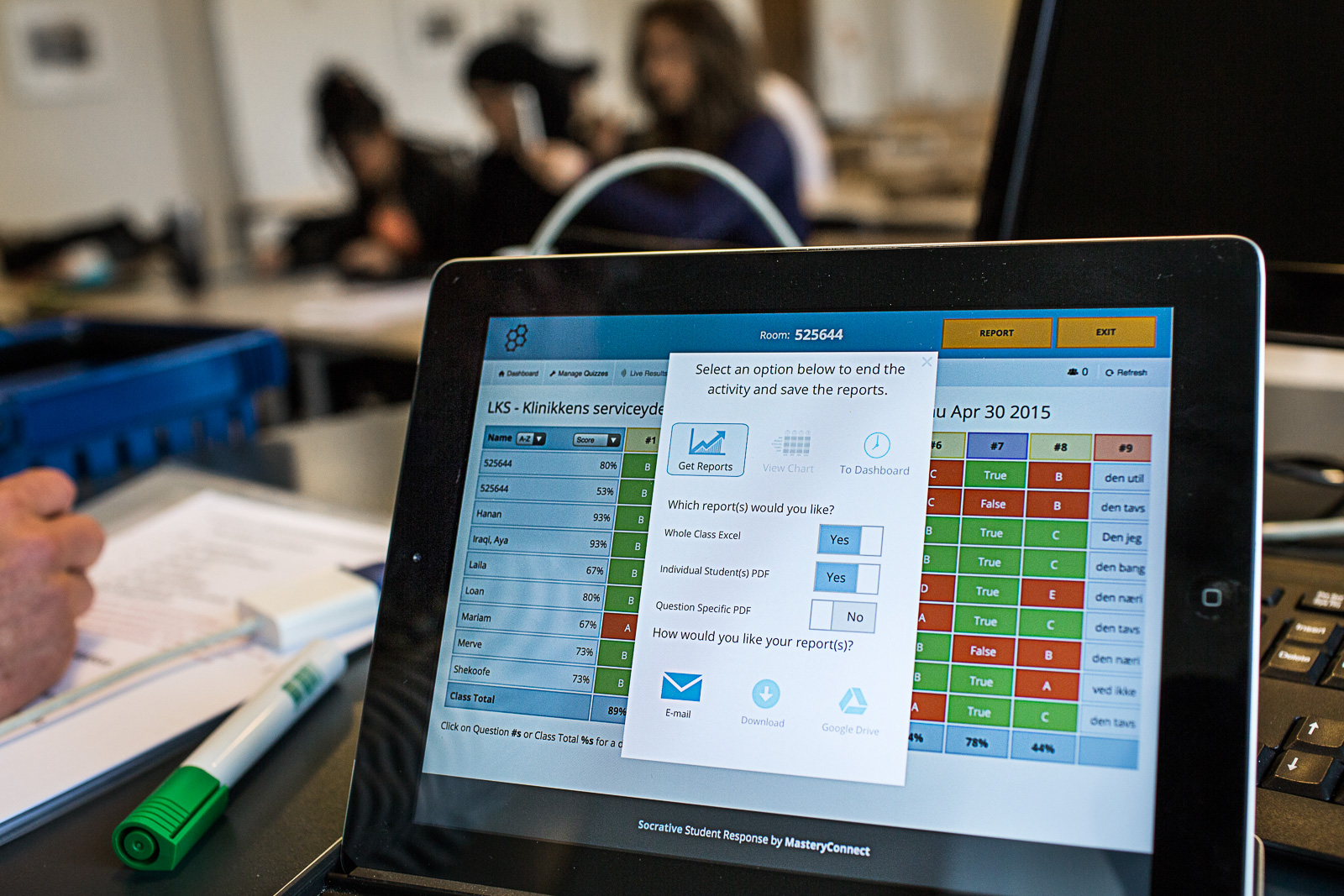IPads support dental surgery assistants during their education
At the School of Oral Health Care, Aarhus University, the students make use of iPads during the teaching. The project was initiated in collaboration with the Centre for Health Sciences Education (CESU), and the students are pleased with their new teaching tool.
![[Translate to English:] Ved siden af iBogen har eleverne også den trykte version af grundbogen samt fysiske hæfter, som et supplement til at læse på iPad’en. Foto: Lars Kruse, Aarhus Universitet. [Translate to English:] Ved siden af iBogen har eleverne også den trykte version af grundbogen samt fysiske hæfter, som et supplement til at læse på iPad’en. Foto: Lars Kruse, Aarhus Universitet.](/fileadmin/_processed_/f/1/csm_iPad_undervisning_LK_790_WEB__a9e1ffcb73.jpg)

When the School of Oral Health Care welcomed the new trainee surgery assistants last year to the school’s ALFA module, it also took the first step in a newly-established project. As part of a new initiative, the students taking the ALFA module in November 2014 received an iPad as a teaching tool. It plays a significant role in the teaching of the students, who come directly from primary and lower secondary school, have reading disabilities and generally have difficulty maintaining a suitably high academic level.
Mads Dahl is a special consultant at the Centre for Health and Medical Sciences (CESU) at Aarhus University and is affiliated with the project. He explains that they could have given the students any form of portable technology. What is important is that it is flexible, mobile, and provides fast access to knowledge.
"An iPad offers knowledge gathered in one place. There are interactive links to other material, while other programs can supplement with new knowledge. An iPad gives the students the opportunity to produce something themselves. They can exploit its opportunities for searching and use the fast access to supplementary material, so they in this way find alternatives to their teaching material. In this context, a book is far more simplified and rigid," says Mads Dahl.
The textbook is an iBook
Annette Smed Svanholm is specialist teacher and contact teacher at the School of Oral Health Care. Working with the vocational schools' publisher, she has developed the course textbook as an iBook. It contains interactive links, search functions, recitation possibilities, word glossaries, exercises, tests, and thirty per cent more images than the printed version. In addition, she has selected ten apps out of the large selection of available teaching-related apps, which in her assessment have particularly good potential in a teaching context.
"Among the apps that the students have in the iBook are three-dimensional programs showing teeth and mouth, as well as note programs," explains Annette Smed Svanholm.
In addition to the iBook, the students also have the printed version of the text book, as well as physical booklets which act as a supplement to reading on the iPad.
The course ended in June this year when the students completed their basic module at the School of Oral Health Care. Jamala Khosrawe was one of the students on the ALFA module, and she was very happy with the iBook.
"The iBook can read difficult sentences out loud and there are also explanations of difficult words. So you don’t get stuck when you read. It also helped me become better at Danish," says Jamala Khosrawe. Her fellow student Loan Tran agrees and adds:
"I think it was a good thing that you could test your knowledge about what you had just read on the iPad. This meant I was much better to both remember and understand the material before I came to lessons."
Students made progress
The iPad project has now ended and Annette Smed Svanholm has seen how the students made progress.
"We saw a growing academic curiosity and interest for the iPad and what it could. The majority of students say that they would not do without their iPad now that they have tried using one for studying," she says.
The School of Oral Health Care has not been able to offer an ALFA module this year due to the reform of vocational education and training programmes.
"The new reform has many digital goals, which means that the current students will therefore also have digital teaching in one form or another. We have not yet been decided which. But one thing is certain. Our experience from using iPads in the ALFA module must and will be implemented for the new basic module class. Otherwise we will have wasted an opportunity," says Annette Smed Svanholm.
Further information
Specialist Teacher Annette Smed Svanhold
The School of Oral Health Care, Aarhus University
ans@ohcare.au.dk
Mobile: +45 2036 9242
Special Consultant Mads R. Dahl
The Centre for Health Sciences Education (CESU), Aarhus University
MD@cesu.au.dk
Mobile: +45 6127 8942